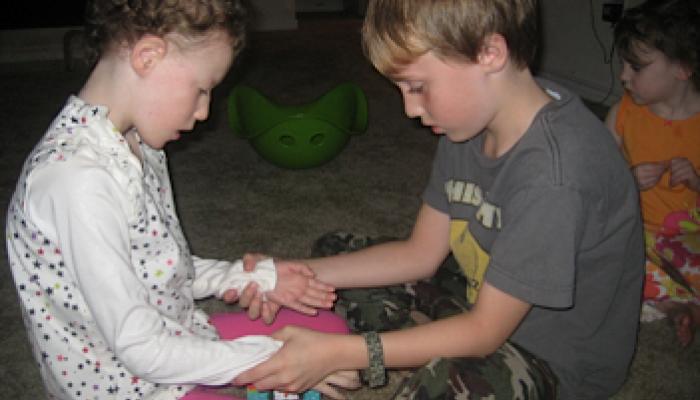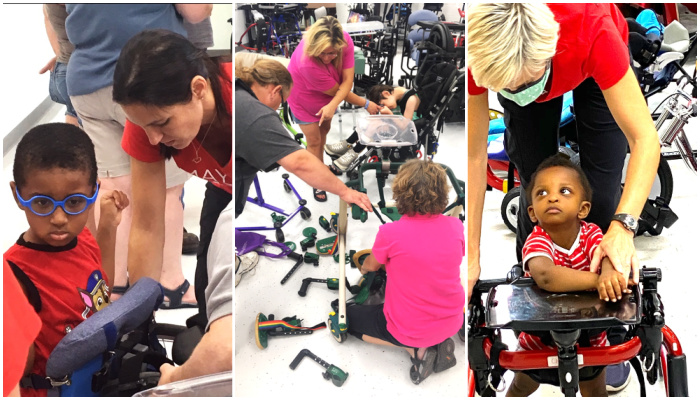Growing up with a special needs sister

By Shannon Gardner
Shannon Gardner writes about her son, Kekoa, and his relationship with his younger sister Oliana, who is blind. You can read more about Shannon, Kekoa, Oli and the rest of the family at Shannon’s blog, Sweet Oli (now Mommy Has Issues), and connect with her on Facebook.
I have often wondered what it is like to be a sibling of a child with a disability. I know it’s an adjustment for any child when a new baby is brought into the house, but what about the child whose life is forever changed beyond just having another little person to live with?
There is so much more to deal with than parents now being more preoccupied with feeding routines, frequent diaper changes and crying episodes. And it’s more than just knowing that you now have to share mommy and daddy’s attention with a new sister when, well let’s face it, you probably weren’t all that thrilled about her joining you. Especially since you were an only child up until now.
Your life changes because now life is riding in the car for hours and then sitting in little rooms with crappy toys and being told to “be quiet” while you try to wait patiently. It’s waiting in these rooms several times a week when all you really want to do is go back home and play with your toys and watch the Cars movie… again. It’s sensing the atmosphere change in your house and feeling the weight of a sadness that you don’t understand, but seems to have followed your sister home from the hospital. The weight that seems to intensify after waiting in another one of those little rooms.
As you get older you start to notice that your sister, who you have waited to play with since she was born, never seems to get old enough to play like you. She doesn’t sit up very well when she does learn to sit up and then she can’t see when you try to show her your newest Lightening McQueen car or your new Hot Wheels race track.
Mommy tells you to put your toys in her hands to show her things, but frankly this doesn’t make sense either because then she only puts your new toy in her mouth and ruins it with slobber. She never learns to move around the house which means mommy has to carry her everywhere. The words “Oli just needs more help” are lost on you when you just want to be picked up and carried around like before.
You love your sister, but just don’t understand her. You ask questions and want to know why she is so different than you, but mommy’s explanations that God made her different don’t make sense. Why can’t the doctors just make her better? She is obviously sick and this is what doctors do. Why doesn’t she ever get any better? Why do they keep taking her to the doctor if they don’t fix her?
As you grow and change, learn your letters, learn to count and tie you shoes you try to show your sister so she can learn, too. But your attempts are to no avail and she doesn’t seem to get it. She won’t talk to you and now you are drifting farther and farther apart. She starts to do strange things like flap her arms, hum loudly and shake her head. You try to play like her to connect with her in some way, but what seems to amuse her is just boring to you.
You never give up though.
You never give up trying to form that connection with her.
She is your sister despite your differences. Mommy and Daddy have always taught you to love her and help her and that is exactly what you do. Not so much out of a feeling of obligation, but because that is just who you are.
Kekoa, you are such a special little boy. I love that you just love her and even though it’s been five years since everything in your life changed, it has never dampened your spirit or your love of your family and life. Please keep your kind heart and don’t pay any attention to people who may try to lead you down a different path.
Related Posts

Special Needs
5 Spring Cleaning Tips for Families of Children with Disabilities
Spring cleaning is an opportunity to create a more accessible, organized, and supportive space for your child with disabilities. Declutter, deep clean, and refresh!

Visual Impairment
The Gift of Understanding: How a Young Child Helps His Blind Father Navigate Life
When a parent is blind, it’s natural for people to wonder how their sighted child will adapt. Will they struggle to understand their parent’s needs? Will they feel burdened by...

Assistive Technology, Support
May We Help: Engineering Independence for People with Disabilities
May We Help is dedicated to designing and building custom solutions that help individuals of all ages achieve mobility, access, and independence, all at no cost.